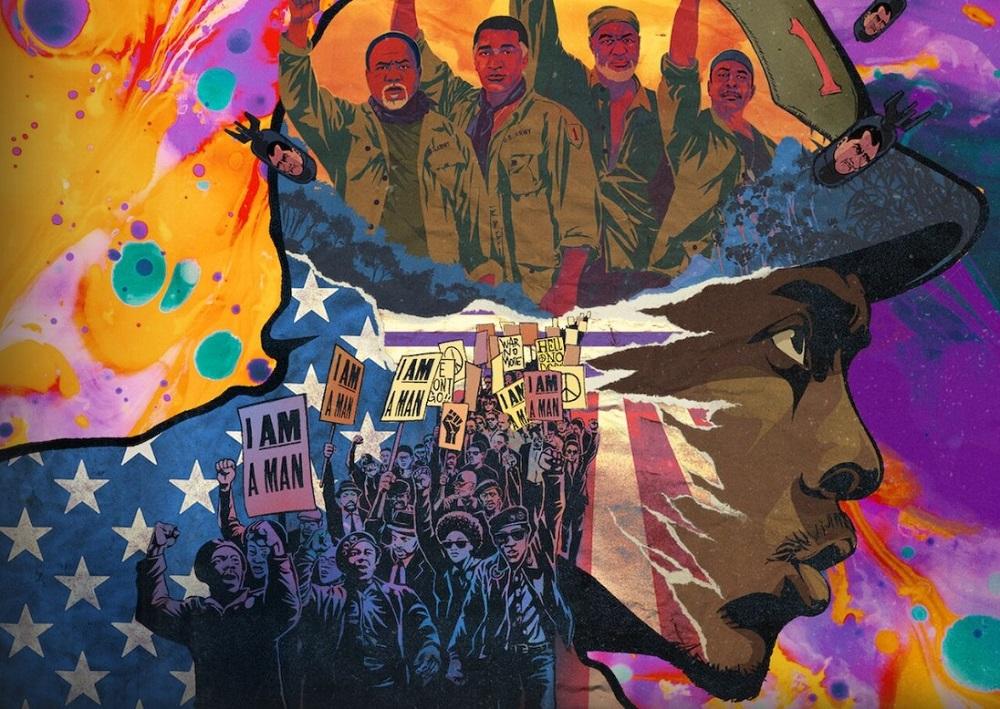On the screen: Spike Lee’s ‘Da 5 Bloods’
Posted By Stephen Loosley on July 15, 2020 @ 13:13

No film about the Vietnam War has ever touched its eerie futility as compellingly as Ted Posts’ classic Go Tell the Spartans (1978), in which the brilliant Burt Lancaster commands an American special forces unit in the central highlands of South Vietnam. The movie is based on the book Incident at Muc Wa by Daniel Ford, who was the correspondent for US Nation. It’s set in 1964.
The key point about the American forward base is that it neighbours a cemetery. The cemetery is the final resting place of dead French legionnaires who were part of the failed colonial campaign to keep Indochina part of the French empire. From time to time, one of the American soldiers actually sees the ghost of a French legionnaire in the mist looking at him. It is a constant reminder of imperial debacle.
Spike Lee recalls the American war in Vietnam in his most recent effort, Da 5 Bloods [1]. The storyline is deceptively simple, but the issues canvassed in the movie are extraordinarily complex, from the America of Muhammad Ali, Malcom X, Martin Luther King and George Wallace in the 1960s through to Donald Trump in the White House and Black Lives Matter today. Lee does not miss.
The year is 1968. The five bloods are five African American soldiers, commanded by their charismatic squad leader, ‘Stormin’ Norman Earl Holloway. The mission at the core of the film is the recovery, then and now, of a cache of CIA gold being used to pay a band of mercenary tribesmen fighting the North Vietnamese Army and the Viet Cong. The plane transporting the gold is shot down and in the original effort to recover the gold, Norman is killed.
Now, the four remaining bloods are determined to recover both Norman’s remains and the gold, for a diverse range of purposes ranging from the best to the worst of motives.
Lee achieves extraordinary performances from his cast, especially accomplished British actor Delroy Lindo as Paul and Clarke Peters as Otis. Many in the cast will be well known to audiences, from earlier work on television as in The Wire, through to movies such as Three Billboards Outside Ebbing, Missouri.
Paul begins as a Trump loyalist, compete with a ‘Make America Great Again’ cap for which he is roundly ridiculed. But it becomes clear, particularly when his son David (Jonathan Majors) arrives unexpectedly, that Paul is severely troubled.
Ho Chi Minh City now has skyscrapers, glitzy nightclubs and McDonald’s, but there are reminders everywhere of the war, especially in conversations with a younger Vietnamese generation, still suffering from loss.
As always, Lee handles confrontations masterfully. There are probing questions about why African Americans, who made up 13% of the US population in 1968, occupied 39% of all combat roles. And the scenes of fighting leave nothing to the imagination. However, the director is not above satirising the most challenging of circumstances. Ride of the Valkyries is played as ‘da bloods’ venture upstream in a launch. The nod to Apocalypse Now is self-evident.
So too is the acknowledgment of Walter Huston’s unrestrained, joyful dance when the gold is discovered in The Treasure of Sierra Madre, written by the mysterious B. Traven, whose work is revived in this film.
The movie’s French characters offer light and shade. The journeyman actor Jean Reno plays an unscrupulous character, Desroche, who wouldn’t be out of place in Ric’s Café in the classic Casablanca. Mélanie Thierry plays the humanitarian Hedy Bouvier, dedicated to lifting landmines.
Lee (born Shelton Jackson Lee in Atlanta, Georgia) was educated at New York University’s graduate film school. He made his mark early with films which directly portray the African American experience, especially in New York City. With films such as Crooklyn and Do the Right Thing, Lee brought the lived experience of African American families to a global audience. Da 5 Bloods continues in this tradition.
Originally, the story was written for a diverse cast of veteran characters, but Lee decided that the film should translate African American experiences in the frontline of the war. It works very well, though Lee demonstrated with Edward Norton and Philip Seymour Hoffman in 25th Hour that he works as easily with characters from different backgrounds.
The Vietnamese characters run across the spectrum of that country’s post-war era. The vets’ guide, Vinh (Johnny Tri Nguyen), is adapted to the future, an American Vietnamese daughter in Michon (Sandy Huong Pham) is a link between the war and a Vietnamese future of commercial intensity, and Veronica Ngo is ‘Hanoi Hannah’, who holds the grim microphone of the past.
This film has a less-than-airtight narrative and there are leaps of faith required from the audience. But there are surprises and deceptive and dangerous walks in the apparent innocence of sunshine in the countryside.
This is a film which is not only eloquent on the Vietnam War, but tells a vivid tale of African American life, from the battlefield to being back in a civilian world that often denied the vets’ very presence and was dismissively ungrateful for their wartime service.
Article printed from The Strategist: https://aspistrategist.ru
URL to article: /on-the-screen-spike-lees-da-5-bloods/
URLs in this post:
[1] Da 5 Bloods: https://www.youtube.com/watch?v=D5RDTPfsLAI
Click here to print.